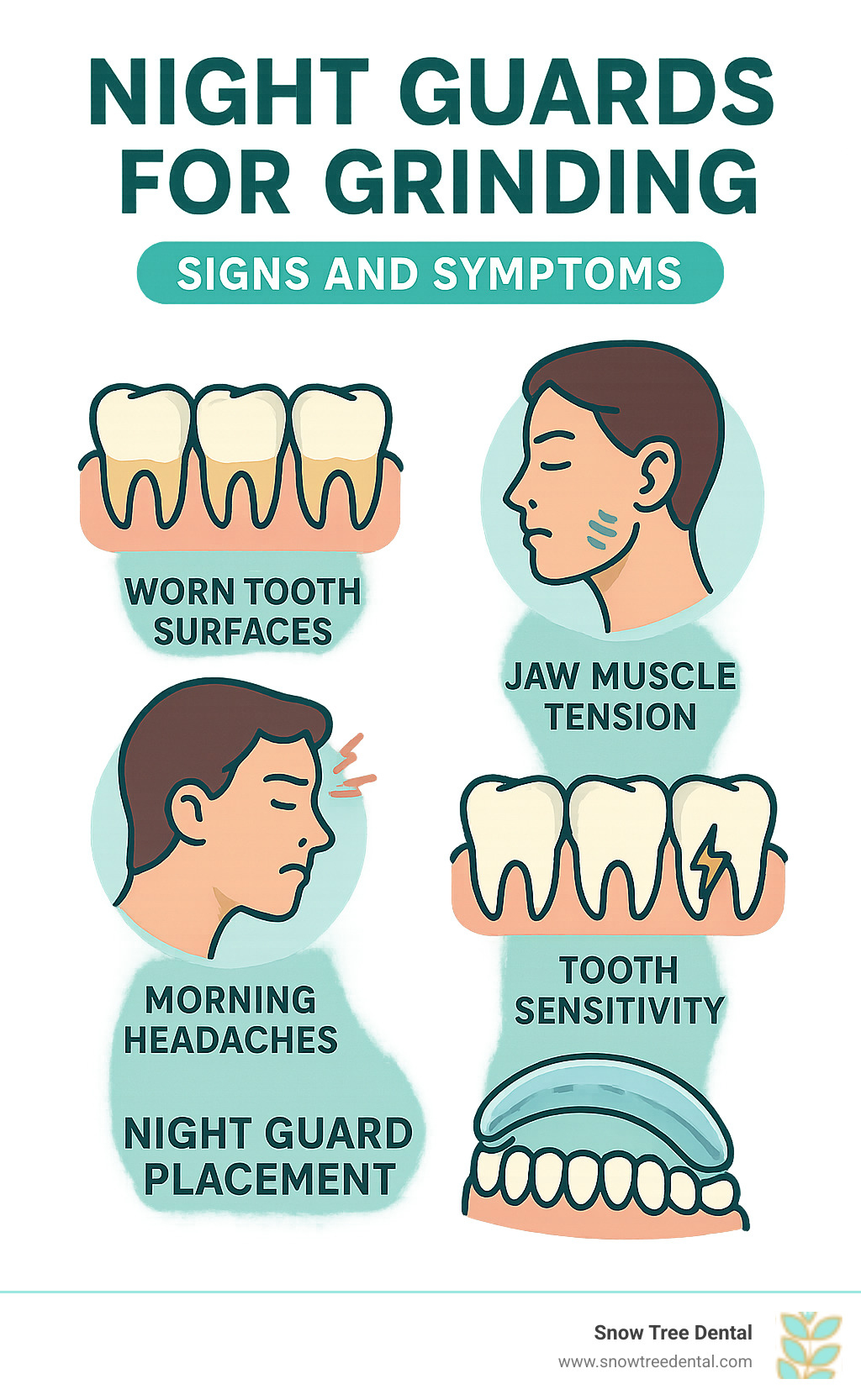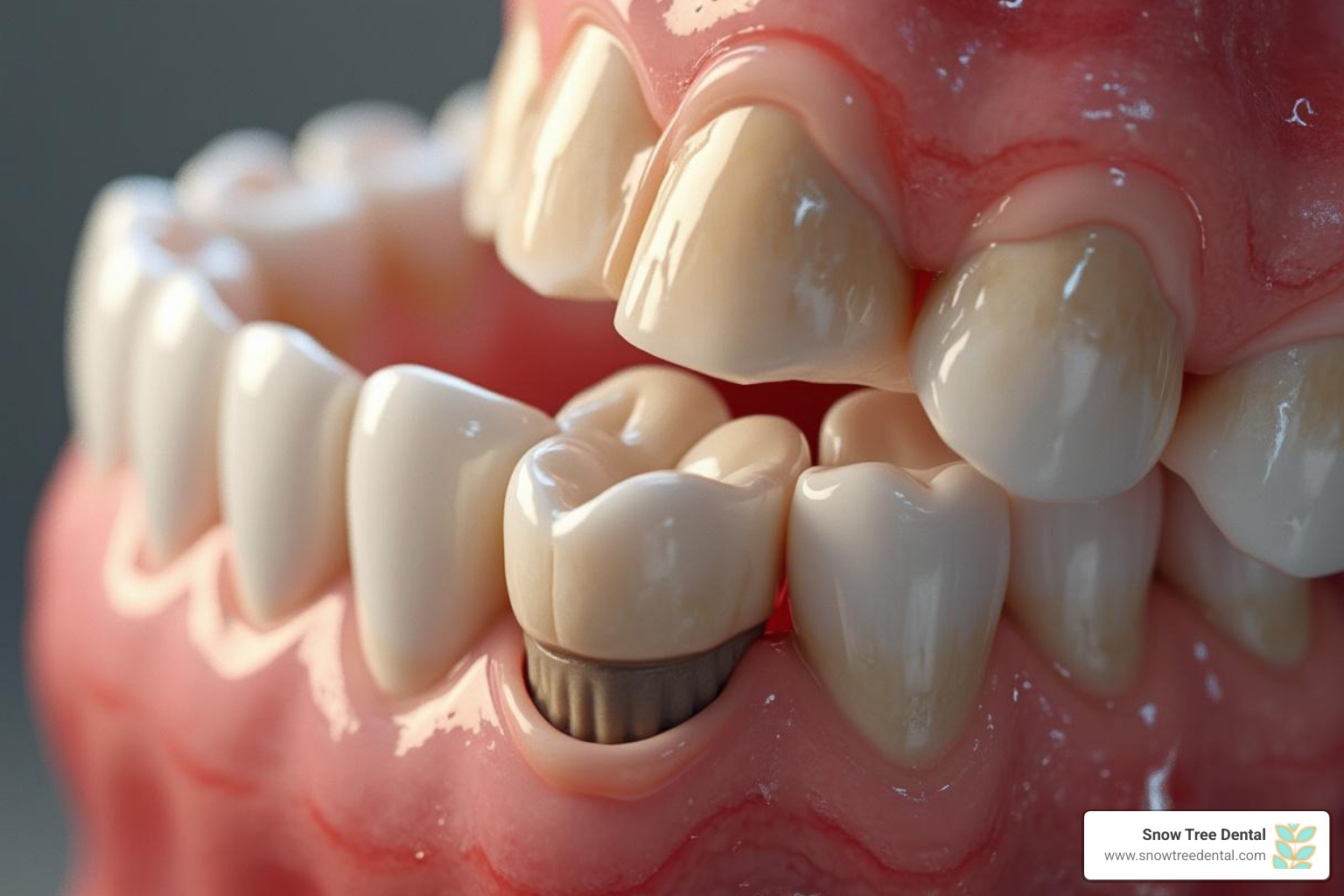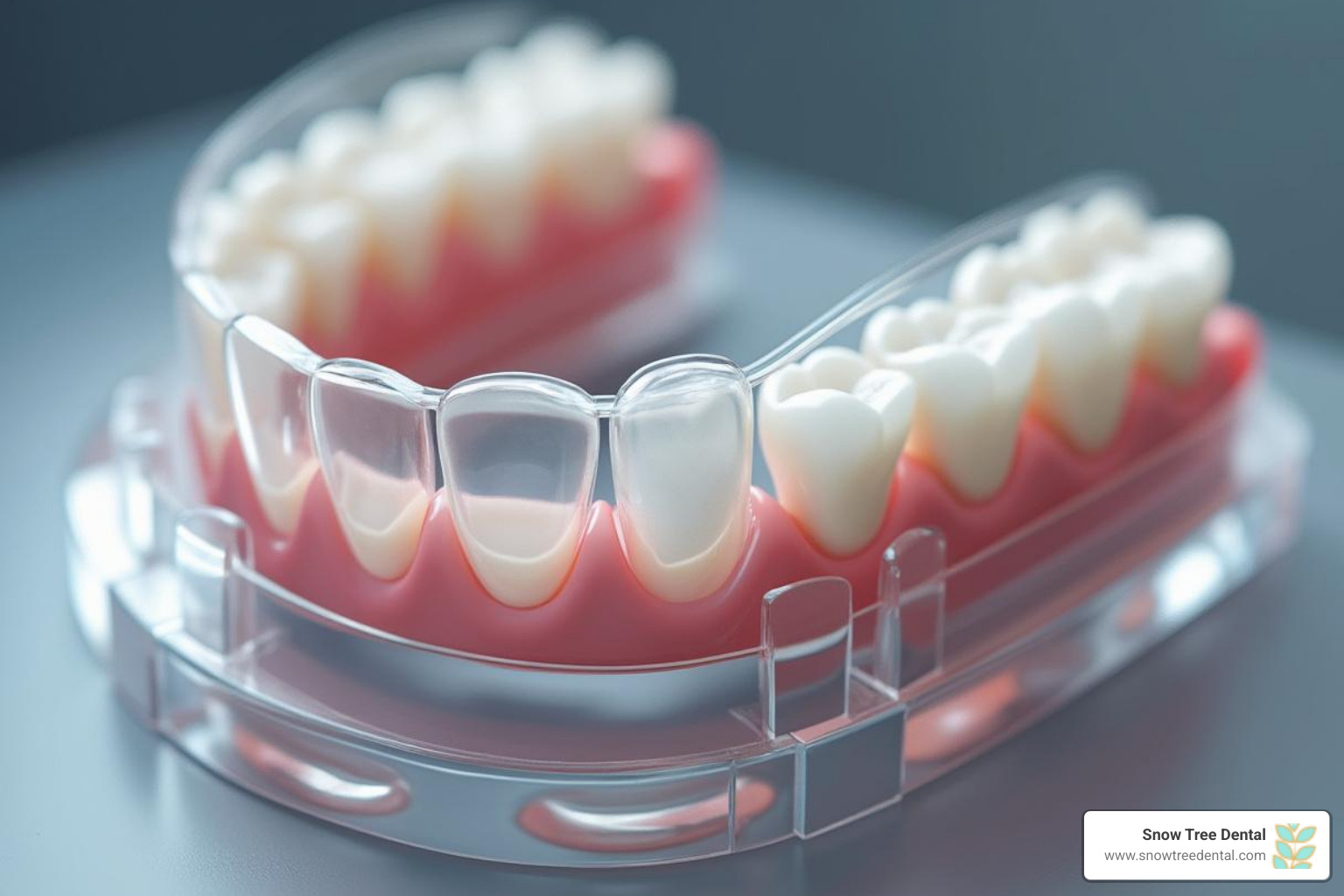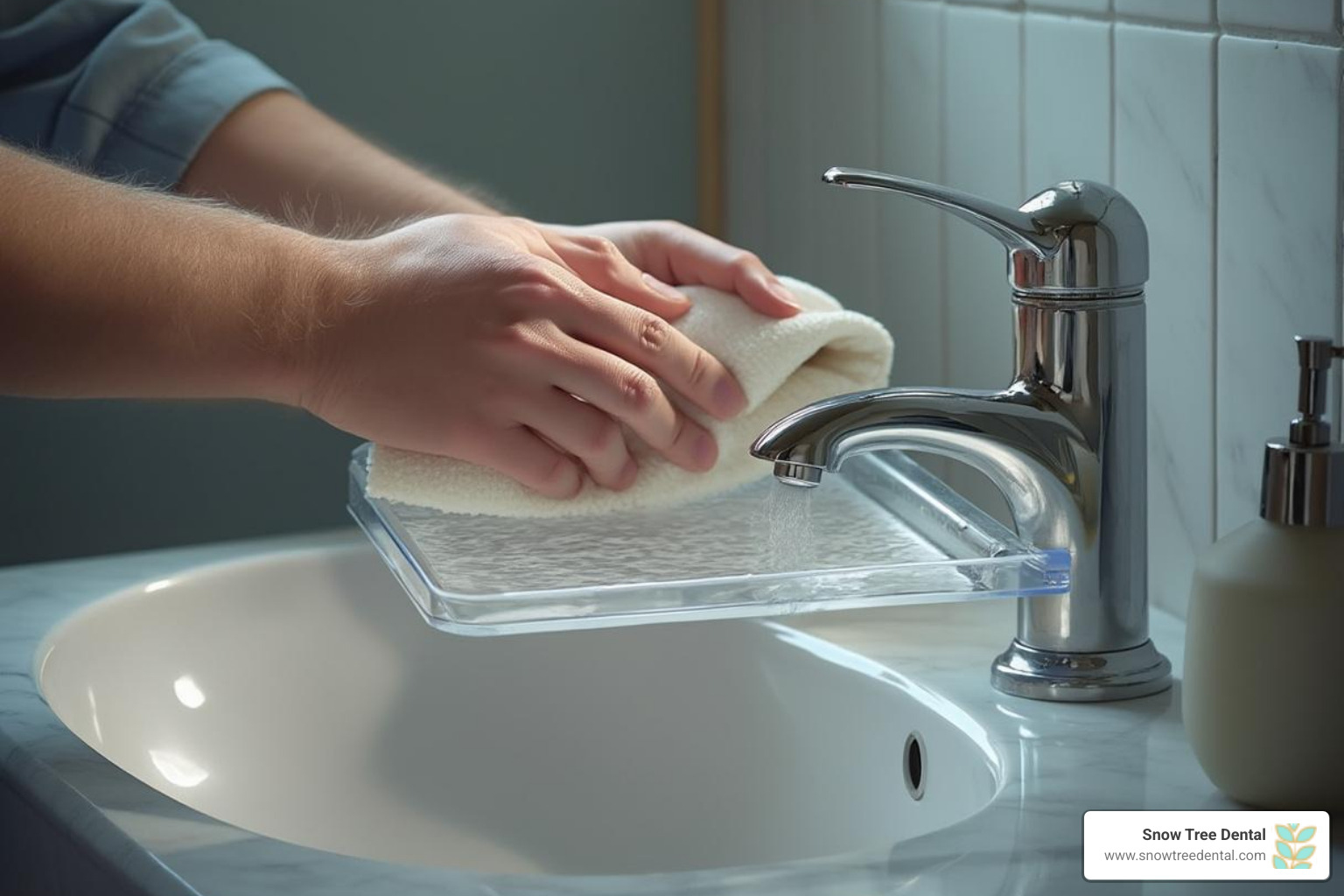Night guard grinding: Protect Your Smile 2025
Why Night Guard Grinding Protection Is Essential for Your Oral Health
Night guard grinding protection is crucial for preventing serious dental damage from bruxism (teeth grinding and clenching). A quality night guard:
- Prevents tooth wear by stopping enamel from grinding away
- Reduces jaw pain by cushioning bite force and relaxing muscles
- Protects dental work like crowns, fillings, and implants
- Improves sleep quality by reducing grinding-related disruptions
- Prevents headaches by stopping morning tension from jaw strain
Teeth grinding affects over 20% of the American population, often without their knowledge until damage occurs. During sleep or stressful moments, your teeth can absorb up to 250 pounds of force per square inch, leading to cracked enamel, chipped teeth, and chronic jaw pain.
A properly fitted night guard acts as a protective barrier, absorbing these forces and allowing your jaw muscles to relax. Custom-fitted guards from your dentist offer the best protection and can last for years.
I’m Dr. Muna Mohammad, and at Snow Tree Dental, I’ve helped many Houston patients protect their smiles from night guard grinding with custom solutions. Early intervention with the right night guard can save you from expensive dental repairs and chronic pain.
Understanding Bruxism: The “Why” Behind Teeth Grinding
If you wake up with a sore jaw or headaches, you might be dealing with night guard grinding. Bruxism—the medical term for teeth grinding and clenching—is common, but many are unaware they do it. The American Dental Association lists warning signs like jaw soreness, headaches, and fractured teeth, which can lead to serious oral health issues.
What is Bruxism and What Causes It?
Bruxism involves clenching (tightening jaw muscles) and grinding (rubbing teeth together), both of which exert immense pressure on your teeth and jaw.
This is a multifactorial condition, meaning several factors often contribute, including:
- Stress and anxiety: The jaw is a common place for the body to hold tension.
- Sleep disorders: Sleep apnea is a major factor. Grinding can be the brain’s attempt to reopen an airway, a connection found in up to one-third of cases according to scientific research.
- Bite alignment: If teeth don’t meet properly, jaw muscles may overwork, leading to grinding.
- Lifestyle factors: Caffeine, alcohol, certain medications, and even genetics can increase grinding.
At Snow Tree Dental, our General Dentistry consultations aim to identify these root causes to create an effective treatment plan for your night guard grinding.
The Hidden Dangers: Symptoms and Long-Term Risks
The real concern with bruxism is the silent, long-term damage. While strong, your teeth aren’t designed for constant grinding pressure. The risks include:
- Worn enamel: The protective outer layer wears away, leaving teeth flattened and vulnerable. Lost enamel does not grow back.
- Tooth sensitivity: As enamel thins, the underlying dentin is exposed, making teeth sensitive to hot and cold.
- Chipped or fractured teeth: Intense pressure can cause cracks or breaks, sometimes requiring crowns or extractions.
- Jaw pain and TMJ disorders: Constant muscle work leads to soreness, fatigue, and can develop into TMJ disorders, causing clicking, limited movement, or a locked jaw.
- Chronic headaches: Morning tension headaches, especially around the temples, are often caused by overworked jaw muscles.
- Damaged dental work: Fillings, crowns, and implants can crack or loosen, requiring premature replacement.
- Gum recession: Excessive force can cause gums to recede, exposing tooth roots.
At Snow Tree Dental, our preventive and Cosmetic Dentistry services focus on protecting your smile from these dangers. Early intervention with night guard grinding protection can prevent years of painful and expensive dental problems.
Your Shield in the Night: How a Night Guard for Grinding Works
A night guard acts as a bodyguard for your teeth while you sleep. It creates a protective barrier between your upper and lower teeth, so you grind against the durable guard material instead of your enamel.
More than just a barrier, it’s a shock absorber. It cushions and redistributes the intense grinding forces, which can reach 250 pounds per square inch. This protects your teeth, jaw muscles, and TMJ joints from the full impact.
By preventing full engagement of the jaw muscles in grinding, the guard allows them to relax. This is why many of our Snow Tree Dental patients report that their morning headaches and jaw soreness disappear after a few weeks of use.
Types of Night Guards: Finding the Right Fit for You
Not all night guards are equal. The right choice depends on the severity of your night guard grinding, comfort, and budget. At Snow Tree Dental, we help you steer the options:
| Type of Night Guard | Description | Pros | Cons | Ideal For |
|---|---|---|---|---|
| Stock (Over-the-Counter) | Pre-formed, ready-to-wear mouth guards. | Inexpensive, readily available. | Bulky, poor fit, uncomfortable, can fall out, may promote grinding, not recommended by dentists for bruxism. | Not recommended for teeth grinding. |
| Boil-and-Bite (Over-the-Counter) | Made from thermoplastic material that softens in hot water and molds to your teeth when you bite down. | More customized fit than stock, affordable. | Still can be bulky, less durable, material can be too soft (promoting grinding) or too hard, requires frequent replacement. | Temporary relief, very mild, infrequent grinding. |
| Custom-Fitted (Professional) | Made by a dental lab from impressions of your teeth, ensuring a precise and comfortable fit. | Superior fit, maximum comfort, most durable, effective protection, can last for years. | Higher initial cost, requires dental visit. | All levels of bruxism, especially moderate to severe, TMJ issues. |
For custom guards, we also select the right material for you:
- Soft guards: Flexible and comfortable, best for mild clenching.
- Hard acrylic guards: Extremely durable for aggressive grinding, providing excellent protection without bulk when properly fitted.
- Hybrid (dual-laminate) guards: These combine a soft, comfortable inner layer with a hard, durable outer shell, offering the best of both worlds.
Why a Custom-Fitted Night Guard is the Gold Standard
While drugstore night guards are tempting due to their low price, they often lead to frustration and continued damage. A custom-fitted night guard is the gold standard for several reasons:
- Precise Fit: Molded to your unique mouth, it stays put all night without feeling bulky or causing a gag reflex, unlike ill-fitting generic guards.
- Superior Materials: We use medical-grade, BPA-free materials tested for safety and durability. They distribute grinding forces evenly, preventing pressure points that can crack teeth.
- Bite Protection: A poorly fitting guard can shift your teeth over time. Our custom guards are designed to maintain your natural bite alignment.
- Long-Term Durability: A custom guard can last for years with proper care, often making it more cost-effective than frequently replacing over-the-counter options.
Potential Side Effects and Adjusting to Your Night Guard
Wearing a night guard takes some getting used to, much like new shoes or contact lenses. For the first few nights, you might notice:
- Initial tightness as your jaw muscles adjust.
- Increased saliva production.
- A slightly different bite in the morning, which should resolve within minutes.
These sensations are normal and usually fade quickly. The key is consistency and patience. Try wearing the guard for short periods during the day to help your mouth adapt. Most patients adjust fully within a week or two. If discomfort persists, contact us for an adjustment to ensure a perfect fit.
Getting and Caring for Your Custom Night Guard
Deciding to protect your smile with night guard grinding protection is a wise investment in your oral health. With proper care, your custom night guard can serve as your nightly protector for years to come.
The Process for a Perfect-Fit Custom Guard
Getting your custom night guard at Snow Tree Dental is a straightforward process:
- Comprehensive Exam: We assess your bruxism, check for damage, and evaluate your oral health to determine the best type of guard for you.
- Impressions: We take detailed digital scans or traditional impressions of your teeth. We use advanced technology for highly accurate designs and faster turnaround.
- Lab Fabrication: Your impressions are sent to a specialized dental lab where technicians craft your personalized guard from high-quality materials. This typically takes about two weeks.
- Fitting Appointment: You’ll return for a final fitting. We check the fit, make any necessary adjustments, and provide instructions on care and use to ensure perfect comfort.
How to Properly Care for Your Night Guard
Proper care is essential to keep your night guard working perfectly and extend its life. Follow these simple steps:
- Rinse Daily: Every morning, rinse your guard immediately with cool or lukewarm water. Never use hot water, as it can warp the material.
- Brush Gently: Use a separate, soft-bristled toothbrush and mild, unscented soap to clean all surfaces. Avoid regular toothpaste, as its abrasives can create scratches where bacteria hide.
- Air Dry and Store: After rinsing thoroughly, let the guard air dry completely before placing it in its clean, ventilated case.
- Deep Clean Weekly: To disinfect and remove buildup, soak your guard in a solution like distilled white vinegar or 3% hydrogen peroxide as recommended.
- Clean the Case: Wash your storage case weekly with soap and water.
- Avoid Harsh Chemicals: Do not use mouthwash, denture tablets, or bleach unless specifically instructed, as they can damage the guard.
Lifespan and Replacement of a Night Guard for Grinding
A custom night guard is durable, but not permanent. With proper care, it can provide reliable protection for 2 to 5 years, sometimes longer. Its lifespan depends on grinding severity, material type, and your care routine.
You’ll know it’s time for a replacement if you notice:
- Visible damage: Cracks, holes, or tears.
- Poor fit: The guard feels loose or has rough edges.
- Persistent odor or discoloration despite cleaning.
- Changes to your teeth: Your old guard may not fit after new dental work like crowns or orthodontics.
Replacing a worn guard is a crucial part of our Preventative Dentistry approach. This investment protects you from night guard grinding damage and is far less costly than future dental repairs.
Beyond Protection: Addressing the Root Causes and Related Conditions
A night guard grinding solution is excellent for protecting your teeth, but it’s also important to address the root causes of your bruxism. A holistic approach that combines a night guard with lifestyle changes can provide more complete and lasting relief.
Can Night Guards Help with TMJ or Sleep Apnea?
The connection between night guard grinding, TMJ disorders, and sleep apnea is significant.
- TMJ Relief: Night guards are very helpful for TMJ disorders. By cushioning the jaw and allowing overworked muscles to relax, they can significantly reduce jaw pain, headaches, and TMJ clicking or popping.
- Sleep Apnea: This is more complex. Grinding can be the brain’s unconscious attempt to reopen an airway during a sleep apnea episode, a link supported by research. In this case, a standard night guard doesn’t fix the breathing issue. If we suspect sleep apnea, a sleep study is crucial. We can refer you to a specialist for proper treatment, which may involve a CPAP machine or a specialized oral appliance.
Supportive Strategies and Lifestyle Changes for Night Guard Grinding
In addition to your night guard, several strategies can help address the root causes of grinding:
- Stress Management: Techniques like meditation, yoga, and deep breathing can calm your nervous system and reduce grinding.
- Jaw Muscle Care: Gentle jaw exercises, warm compresses, and physical therapy can relax overworked muscles.
- Dietary Adjustments: Reducing caffeine and alcohol, especially in the evening, can lead to calmer nights and less muscle activity.
- Bite Correction: For some, orthodontic treatment to fix a misaligned bite may be a long-term solution.
- Advanced Options: For severe cases, we may discuss options like Botox injections or biofeedback therapy.
- Proper Sleep Posture: A supportive pillow that keeps your head and neck in a neutral position can also help.
Finding the right combination of strategies is key. We’ll work with you to monitor your progress and adjust your treatment plan as needed to protect your smile from night guard grinding.
Frequently Asked Questions about Night Guards
I get these questions almost daily from patients considering night guard grinding protection. Let me share the answers that help put minds at ease:
Is it uncomfortable to sleep with a night guard?
It can feel a bit odd at first, similar to wearing new glasses. However, most patients adjust within a few nights and forget they’re even wearing it. A custom-fitted guard is key to this comfort; unlike bulky store-bought options, a professional guard is thin, smooth, and precisely molded to your teeth. The brief adjustment period is a small trade-off for relief from jaw pain and headaches.
Should I get a guard for my upper or lower teeth?
Most people only need one guard, either for the upper or lower teeth, for complete protection. The best choice depends on your specific bite, wear patterns, and comfort. Upper guards are common as they often stay in place better, but lower guards are sometimes preferable. During your consultation, we will determine the ideal solution for your mouth—no guesswork involved.
Does dental insurance cover the cost of a night guard?
Yes, most dental insurance plans offer coverage for custom night guards when they are medically necessary to treat bruxism. Coverage typically ranges from 50% to 80%, but every plan is different. You can also use funds from your HSA or FSA to cover the cost. Our team at Snow Tree Dental is happy to check your benefits for you, so you know exactly what to expect.
Conclusion: Protect Your Smile for a Healthier Tomorrow
The silent damage of night guard grinding can lead to worn enamel, chipped teeth, headaches, and jaw pain. Left untreated, bruxism becomes a costly cycle of dental repairs and chronic discomfort. The good news is that you can protect your smile.
A custom-fitted night guard is the best defense. It absorbs grinding forces, protects enamel, and allows your jaw muscles to relax. Unlike ill-fitting drugstore options, a professional guard provides effective, comfortable protection.
At Snow Tree Dental in Houston, we use modern technology to create precise, comfortable night guards. With flexible scheduling, transparent pricing, and our in-house dental plan, quality care is always accessible.
Your smile deserves professional protection. An investment in a custom night guard today can save you from pain and expensive dental work tomorrow. Don’t let another night of grinding damage your health.
Ready to give your teeth the shield they need? Learn more about our comprehensive dental services and schedule your consultation today.








